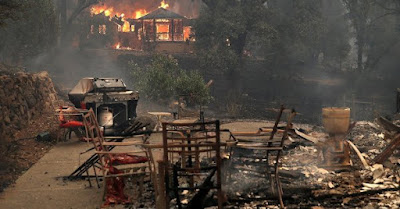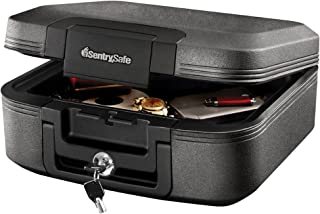
Whether you have plenty of time to prepare, or you need to leave in a hurry, everyone should have a plan and a list of everything they need to have with them during an evacuation. One thing you could do is print this article and post it in a prominent place in your home, where you can quickly review it and use it as a checklist when you need to leave in hurry. Just add your own notes in the margin about where to find things.
If You Have 15 Minutes or Less to Evacuate
Obviously, if a wildfire is roaring up the hillside towards your home in the middle of the night, you may have to rush out the door in your pajamas, jump in your car, and take off, leaving everything behind. Your life is more important than anything in your home.
However, in most cases, people have at least a a few minutes of warning that they need to evacuate. In that situation, below are the most important things you need to make sure you have with you. Clip out this list and put it in several convenient places in your home, such as in the drawer of your nightstand, on the door of your refrigerator, or some other safe place where it will be easy to find. In an emergency, it is easy to get rattled and forget something obvious, such as your wallet or cell phone. Having a list will help you stay focused on the most important things you need to do.
Your family - Try to be sure that everyone is accounted for and in the car with you before you worry about anything else.
Your pets - If possible, put your pets in a small, portable pet kennel (Ad). They come in a variety of shapes and sizes. It will make it easier to control your animals, especially if they become afraid or excited about what is happening. Put your pets in the car as soon as you can, so they do not panic and disappear. However, do not delay your evacuation by spending a lot of time looking for them. If they hide and cannot be found, you may have to leave them behind. In the event of a fire, let the firefighters know about any missing pets and they will try their best to rescue them.
Your purse and wallet - If you have your wallet and/or purse with you, it means you will probably have your driver's license, some cash, your bank debit card, and credit cards. This will enable you to rent a hotel room, or purchase food and other items you may need while you are evacuated.
Your medications - If you are taking any life saving medications, grab a bag and just sweep them into it. Do not take the time to sort through them. Just take everything you think you might need. Once you get to an evacuation center, they can help you replace any medications which you may have missed.
Important documents - Ideally, everyone should have a small portable lockbox or fireproof home safe (Ad) that contains your important documents, all in one place. These documents should include your passports, birth certificates, social security cards and copies of insurance policies, including policies on your home and automobiles. If you store all these papers in one convenient lockbox or safe, it will be easy to grab all the documents you would otherwise not have time to locate. Later, it will save you time if you do not have to replace your important documents. You may also want to keep copies of your important documents in a notebook, which you can grab as you rush out the door, even if you have very little time. My husband and I have a notebook which contains copies of our wills, trust, Advanced Directives, I.D.'s, insurance policies, marriage certificates, birth certificates, and other important information we might need in an emergency.
Small electronics - Because most of us have a great deal of important information stored on our phones, tablets, and laptop computers, you want to try to grab these things, along with their chargers, before you take off. It will make it easier for you to find contact phone numbers of your friends and family, and enable you to let others know you are OK.
If the items above are the only things you have time to grab, at least you will be leaving with your most essential items. Hopefully, however, you will have enough evacuation time to toss a few more items in your car.
IMPORTANT: If you are fleeing a wildfire, do not spend more than 5 minutes gathering as much as you can before you leave. Fires can move quickly and you may have less time to get to safety than you think you do.
If you have a little extra time to evacuate, you still need to hurry. This would include situations such as when a fire is in your general area, but has not reached your neighborhood; or when a hurricane has taken an unexpected turn towards you, but is still a few hours away; or when you live in a flood prone area with a major storm headed your way. In these situations, you might have an extra 30 to 60 minutes to evacuate, or even a little more time, but you still should not linger too long. If you are fortunate enough to have this extra time, what additional items should you take with you?
Make sure you have everything listed above - Do not let yourself get distracted by things you want to take, until you are sure you have loaded everything you need to take. First, double-check that you have everyone in your family, and, if possible, your pets, wallets, medications, small electronics and important documents.
Secure Your Preschoolers in the car - Strap your youngest children into their car seats, and pack up a few things for them. Make sure they have a favorite stuffed animal they can cling to. Things could be very crazy for the next few days, and having their favorite toy will bring them some comfort when they do not understand what is happening. Make sure you also have diapers, formula, or any other essentials which could be hard to find for a few days.
Let Your School Age Children Grab What they Want - Give children who are old enough a suitcase or even a couple of trash bags. Tell them to put some clothing and their toothbrushes in one bag, and a few of their favorite toys in the other. This could reduce their stress in two ways. First, you are giving them a task which will distract them from what is happening. Second, if your home is destroyed, at least your children will have been able to bring a few of their favorite things with them. Most other things can eventually be replaced.
Fill a suitcase or a couple of shopping bags with your valuables - Since you have a little extra time, put your jewelry box, small family heirlooms, photo albums, artwork, sterling silver, and similar items in a few shopping bags and put them deep in interior of your car's trunk. These are things you will not need to get out when you stop at a hotel or an evacuation center. However, it will give you peace of mind to know that they are safely locked in your car.
Fill a suitcase with an armload of clothing - Ideally, you should have a change of clothing, underwear, toiletries and similar items for everyone in your family. However, this is not the time to pack carefully. Just grab a few things and stuff them in a suitcase. You just need enough clothing to last a few days. If your home is totally lost, local charities or your private insurance will help you replace some of your clothing.
Do a Last Minute Walk-Thru of Your Home - If you have the time, grab a trash bag and your cell phone camera. Use your cellphone to make a video and quickly document everything you are leaving behind. It will help with your insurance claims. Meanwhile, fill the trash bag with any last minute things which you would like to bring with you. Suggestions include favorite framed photos, the family Bible, mementos of trips, or a favorite painting still hanging on your wall. Grab anything you can quickly stuff into the bag. You will cherish these things if you eventually have to replace your home.
Take All Your Cars With You - Although it may seem more convenient to have your whole family in one car, if there is more than one driver in the family, have them each drive one of the cars out of the evacuation area. You do not want to lose one of your cars, if you can avoid it. In addition, the extra car will give you more space to take things with you. If your home is destroyed and you need to stay in temporary housing for a while, it will also be more convenient if everyone has their car with them.
Below is a list from FEMA which you may also want to print out. It includes some of the additional items you may want to bring with you when you evacuate, if you have time. It includes items you may want to have if you are uncertain about the conditions where you will be staying after an evacuation. Below it you will find more emergency evacuation information.
How to "Prepare" to Evacuate
About 20 years ago, there were a number of fires burning in our part of California. Although our home was not in immediate danger, we were told to "Prepare to Evacuate." This gave us plenty of time to fill our cars with all the things mentioned in the lists above, as well as do a better job packing a suitcase to take with us. Fortunately, in that case, the fires did not come close enough to our home to necessitate an evacuation, although many other Southern California homes were destroyed. By feeling prepared to evacuate, however, I was more comfortable knowing that everything portable that I valued was safely locked in my car, and we could have dropped everything and evacuated with a moment's notice.
How to Pre-Plan for an Evacuation
Do you live in an area where evacuations are common? Perhaps you live in an area which gets hit by a hurricane every few years, or occasionally floods. You might live near a national forest that is prone to wildfires. If this describes your situation, you may want to pre-plan for a potential evacuation. Here are some of the steps you can take long before you get an evacuation notice:
Fill a back-pack or "get away bag" for each member of the family - This get-away bag (Ad) should contain a couple of changes of clothes, underwear, a jacket, an old pair of tennis shoes, and basic toiletries such as toothpaste and a toothbrush. Be sure to include a small supply of essential medications. If you have growing children, you should repack the bags at least once a year.
Pack an extra bag with copies of important documents - Make copies of your birth certificates, social security cards, driver's licenses, insurance papers, and other important documents. Put them in your bag, along with a list of important phone numbers you may need to know in an emergency. You may want to include a small amount of cash, in case local ATM machines are out-of-order during an evacuation. Keep your original documents in a small fireproof home safe (Ad), and keep an extra set of the safe keys in your get-away bag. In case you have to evacuate in a hurry, and you have time, you can add your safe, lockbox and small electronics to this backpack and take off quickly. If you are unable to take the safe with you, there is a good chance it will survive some types of disasters and you can find it after the emergency has passed.
Having get-away bags will also be convenient if you and your family leave your home each morning for school and work. In an emergency you would not be able to return home to get important belongings. In that event, you can keep the get-away bags in your car. If there is an emergency evacuation in your neighborhood, you can simply pick up your family members at their jobs or school and go to the evacuation center or a hotel. In a crisis, you would know that you have some basic necessities for each member of the family, as well as copies of important documents. It is likely that if you were away from home during the day, you would also have your cell phones and, possibly, other small electronics with you. It would not be an ideal situation, but it would be better than being caught by surprise without anything you might need.
After An Evacuation - What Happens?
Fortunately, most of the time you will all be able to return home safely after the emergency is over, and everything will be exactly as you left it. You can return your belongings to their rightful places, stow away your get-away bags, and relax. You might even decide to update your get-away bags before stowing them away in the trunk of your car.
However, if your home is no longer habitable after a disaster, you will be glad you were so well-prepared for evacuation. You will be able to start over and still have at least some of your favorite belongings with you. If you have either homeowner's insurance or renter's insurance, many of your lost items will be replaced.
After most major emergencies, FEMA, state agencies, the Red Cross, and local charities will help you fill out the paperwork to file claims, apply for loans, and get other types of assistance. These organizations may also be able to help you obtain temporary housing and a few items of furniture and clothing. Despite this generous assistance, you and your family will feel much better if you also have been able to bring some of your own belongings with you.
While not everything you own can be replaced, it is important to remember is that you were able to save your family. Anything else you save beyond that will just make it easier for you to recover from a disaster. The most important thing is that you are able to move on with the people you love and cherish.
 |
| Buy this at: etsy.com/shop/DeborahDianGifts |
Enjoyed this post? Never miss out on future posts by following us. You will receive one weekly email containing the most current post.
If you are interested in learning more about financial planning, Social Security, Medicare, where to retire, common medical issues as you age, travel and more, use the tabs or pull down menu at the top of the page to find links to hundreds of additional helpful articles.
Disclosure: This blog may contain affiliate links. If you decide to make a purchase from an Amazon ad, I'll make a small commission at no extra cost to you.
You are reading from the blog: http://www.baby-boomer-retirement.com
Photo credits: Pixabay



